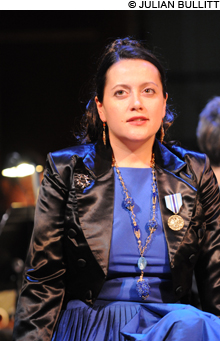
STRATOSPHERIC In the title role of Boston Baroque’s Partenope, Amanda Forsythe was the star she needed to be. |
Martin Pearlman's Boston Baroque, "America's First Period-Instrument Orchestra," kicked off its new season at Jordan Hall with what is probably the first Boston performance of a work from the height of Handel's career, Partenope — a comic opera in Italian that was originally staged in London with modest if not brilliant success. Boston Baroque's version was both modest and brilliant — and thoroughly successful.Modest, in the sense that it was staged with a minimum of scenery (a few chairs and benches) and the "costumes" were characterful street clothes and evening wear. Still, the singing was all from memory, and David Gately's witty and musical staging could have been equally convincing in a more elaborate production. Pearlman's orchestra was spot on, with especially outstanding work from flutist Christopher Krueger, timpanist John Grimes, and Victor Coelho on theorbo, and responsive strings that sometimes seemed to be leering naughtily at the characters' sexual predicaments.
And what singing! Unlike the earlier GiulioCesare or the later Orlando or Ariodante, the vocal writing in Partenope has more arias with coloratura fireworks than passages of lyrical expansion. Handel seems to have written the role of Partenope for an Italian soprano, Anna Strada, with an extraordinarily high voice and phenomenally flexible coloratura technique. But all six solo roles make extravagant vocal demands. And this was a remarkable cast, especially the scintillating Amanda Forsythe in the title role.
Partenope is the Queen of Naples. She has fallen hard for Arsace, the Prince of Corinth (British countertenor Owen Willetts), for whom he's abandoned his fiancée Rosmira (West-Coast mezzo-soprano Kirsten Sollek), clearly a physical attraction. The queen has two other suitors as well, the shy Armindo, Prince of Rhodes (Canadian countertenor David Trudgen), and Cumaean prince Emilio (Boston tenor Aaron Sheehan), a potential enemy who offers her a peace treaty if she'll marry him. Ormonte (baritone Andrew Garland) provides Partenope with sturdy political advice.
Willetts, who made his American debut last season in the title role in Boston Baroque's Glück Orfeo, here in a part originally conceived for a castrato, sounded more "counter-alto" than countertenor, his lower register projecting unusual warmth but capable of great flexibility, too. He also conveyed Arsace's conflicted emotions, sincerely regretting his sins against Rosmira (he winds up with a scarlet A pinned to his shirt), but still obviously turned on by the more glamorous and powerful Partenope. Trudgen has a higher, lighter, more conventional but pleasing countertenor voice, and he was adorable as "Bashful" (deliciously embarrassed when Partenope pulls an extended string of pearls—surprisingly phallic — out of his pocket). Sollek has a firm, slightly steely mezzo-soprano tone, and in her tight pants and cap, she was convincing as both the betrayed Rosmira and the male warrior she's pretending to be in her search for revenge. Sheehan delivered some of the opera's most fiendishly difficult music, though the elaborate coloratura sometimes sounded a little dry. Garland (who'll be back for Boston Baroque's Messiah in December) anchored the bottom range with a pleasingly firm tone.